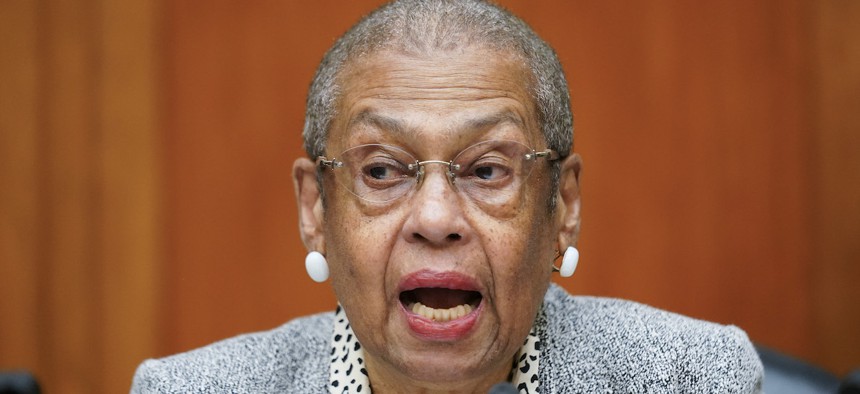Bill to alleviate federal pay compression introduced by House Dems

Del. Eleanor Holmes Norton, D-D.C., speaks during a House Committee on Oversight and Reform hearing on June 8, 2022. The legislator announced the new pay compression relief bill on Tuesday. Andrew Harnik-Pool/Getty Images
The Pay Compression Relief Act would effectively allow General Schedule employees to receive annual increases to both basic and locality pay, even if they have already hit the federal pay cap.
A group of House Democrats led by Del. Eleanor Holmes Norton, D-D.C., on Tuesday introduced legislation aimed at alleviating the impact of federal pay compression on some senior federal employees in cities with high costs of living.
Pay compression refers to when a federal worker, typically in the Senior Executive Service or the upper echelons of the General Schedule, is paid at or near the federal pay cap, meaning that when the president or Congress implements the annual federal pay raise each January, they miss out on some or all of the portion of the pay raise that goes toward increases in locality pay. The phenomenon is particularly prevalent in cities with high costs of living, like Washington, D.C., New York and San Francisco.
Last year, Government Executive found that there were 18 different locality pay areas where multiple steps within the GS-15 pay grade had reached the federal pay cap, and in the San Francisco area alone, the top step of the GS-14 grade had reached the gap, in addition to seven of the steps within the GS-15 grade.
Although the issue of pay compression has simmered for years, it gained renewed focus last year after President Biden what was then the largest federal pay raise proposal in 20 years of 4.6% on average. Biden’s budget proposal for fiscal 2024 set a new record for recent pay increases, floating an average 5.2% pay raise next January. Thus far, both chambers of Congress have left that pay raise plan in tact in their respective appropriations bills.
This bill would help the federal government hire and retain the most qualified individuals.
-- Del. Eleanor Holmes Norton, D-D.C.
On Tuesday, Norton announced the introduction of the Pay Compression Relief Act (H.R. 5171), which effectively creates an exception to the federal pay cap for General Schedule employees who otherwise would receive only a portion of their annual pay raise due to the cap. The bill is cosponsored by Reps. Gerry Connolly, D-Va., Glenn Ivey, Jamie Raskin and David Trone, all D-Md.
“Today, I introduce the Federal Employee Pay Compression Relief Act of 2023, which would allow federal employees who reach the pay cap in their pay system to receive the base and locality pay adjustments they would otherwise be entitled to,” Norton said in a statement. “Currently, federal employees who reach the pay cap do not receive such adjustments. This bill would allow many of the longest-serving federal public servants . . . to receive the pay adjustments they would be entitled to but for the pay cap. This bill would help the federal government hire and retain the most qualified individuals.”
The Senior Executives Association and other groups representing federal managers and executives have been at the forefront of the push to address pay compression. SEA Executive Director Jason Briefel said that while it is “excellent” to see lawmakers try to tackle the issue and provide relief to feds impacted by it, he is concerned that the bill doesn’t address similar compression within the Senior Executive Service, whose salary increases have been stymied by a long-running congressional freeze on the pay of senior political appointees.
“We have been in touch with Delegate Norton’s office and shared some initial feedback, and we hope there’s an opportunity to continue working with her and other members on this issue,” Briefel said. “That said, I don’t’ want to stand in the way of what potentially could be a meaningful incremental reform. Even the fact that this bill is out there hopefully provokes some technical assistance from [the Office of Personnel Management] to figure out how many employees would be covered by this and what it's going to cost. It helps give us info that has been absent from this debate in the past.”
One of Briefel’s concerns is how a pay cap waiver for General Schedule employees but not senior executives could make recruitment into the SES even harder.
“We would never suggest that our members need to get the same salary that they’d get in industry, but it is true that for the last 20 years, the risk-reward ratio of entering the SES has been going in the wrong direction,” he said. “And again, if enacted—and this is the only thing Congress can move forward—it could exacerbate the challenges within SES to both attract great candidates to consider entering the service altogether, but also keeping folks. Keeping people in government service is increasingly difficult for a variety of factors, and the ever-growing pay differential, especially for great people in leadership roles, can’t be ignored.”
Biden’s fiscal 2024 budget proposal alludes to the fact that the administration plans to put forward its own plan to fix pay compression some time this year. Briefel said his organization, along with other federal managers’ groups, are scheduled to meet with OPM later this month to discuss its status.




